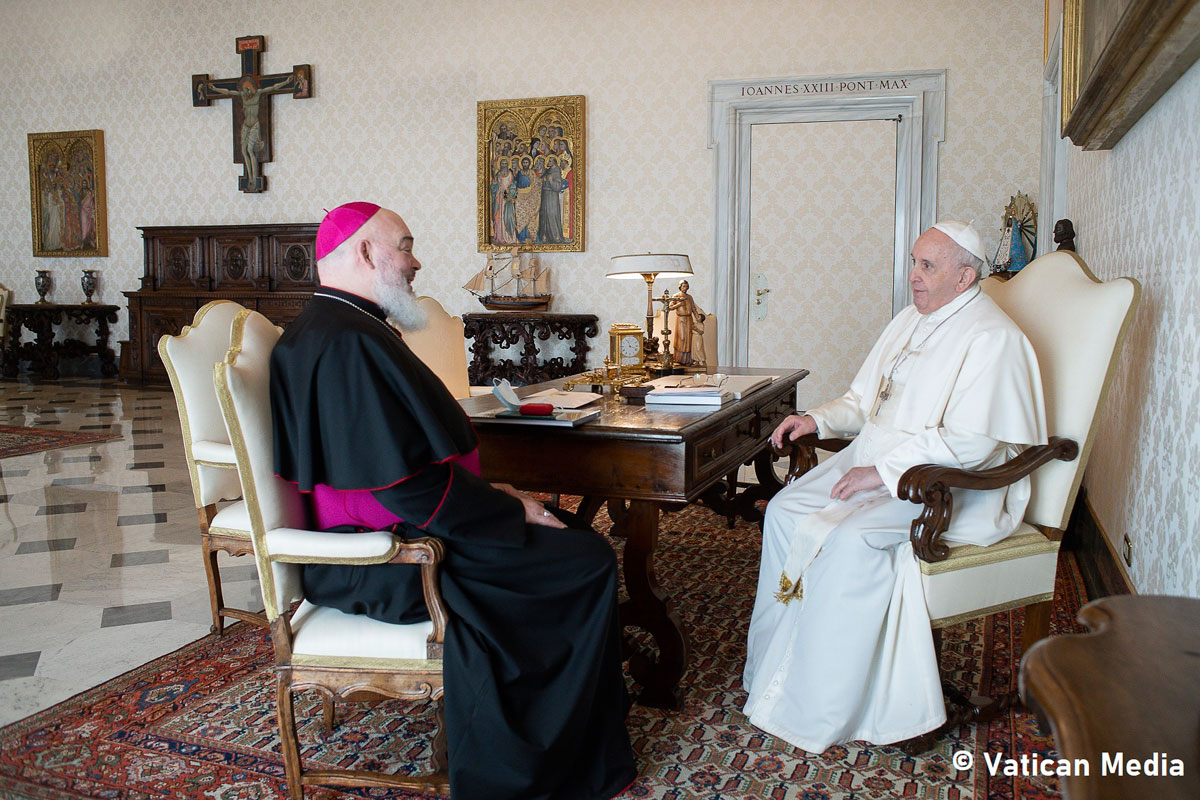New cardinal in Tehran, in the footsteps of Saint Francis as an 'instrument of peace'
AsiaNews met with Archbishop Mathieu on the sidelines of the Synod, a few hours before the announcement of his elevation to the rank of cardinal. The appointment shows the pope's "incessant desire" to "weave and strengthen bonds with all peoples." The Iranian people are "welcoming", not just " chadors and beards” as portrayed in the West.
Rome (AsiaNews) – “May this choice to work closely with the Holy Father, in conformity with Jesus Christ, be a further sign for the Church, the people of God, of the incessant desire to weave and strengthen bonds with all peoples, in this case Iranians in general and their leaders in particular,” said Archbishop Dominique Joseph Mathieu of Tehran-Ispahan, who was elevated to the rank of cardinal (for the complete list, click here) by Pope Francis yesterday at the end of the Angelus when he announced a consistory for 8 December.
This decision bears “witness of how much God has chosen the weak of the world to confuse the strong,” said the new cardinal in a message to AsiaNews. Following in the “footsteps and spirit of Saint Francis of Assisi, in obedience to the Pope, we shall carry out the mission to be in the common home for all brothers and sisters of peace, in deeds and, if possible, in words.”
Dominique Joseph Mathieu was born on 13 June 1963 in Arlon, Belgium. After high school, he entered the Order of Friars Minor Conventual and made his solemn profession in 1987. Ordained a priest on 24 September 1989, he was incardinated in 2013 in the Provincial Custody of the East and the Holy Land.
Over the years he has held various positions: vocation promoter, secretary, vicar and provincial minister of the Belgian Province of the Friars Minor Conventual, rector of the National Shrine of St Anthony of Padua in Brussels, and director of its Confraternity.
In 2013, he joined the Provincial Custody of the East and the Holy Land in Lebanon, where he served as custodial secretary, educator, master of novices and rector of postulants and candidates.
On 8 January 2021, he was appointed archbishop of Tehran Ispahan (Iran), with consecration celebrated on 16 February, the feast of Saint Maruthas, patron saint of Iran, in the basilica of the XII Apostles in Rome.
Pope Francis’s decision to elevate to the rank of cardinal the Latin archbishop of Tehran, who heads a numerically small community but one rich in faith and part of the "periphery" of the world, seemingly brings an element of surprise.
Yet, this is part of a pastoral approach centred on paying attention and showing closeness to places on the margins of the world, as evinced by the pontiff’s latest apostolic journey in early September to Southeast Asia and the Pacific.
Iran is home to a few thousand Catholics (and just over 100,000 Christians) out of a total of a population of almost 82 million, mostly Muslims (90 per cent Shia, 5 per cent Sunni).
Local Churches follow Chaldean, Armenian and Latin rites, plus some Europeans and Latin Americans working in the Islamic Republic.
According to the Iranian Constitution (Art. 13), Christians, Zoroastrians and Jews are free to worship “within the limits of (Islamic) law”. Ethnic Armenian and Assyrian Christians are represented in the Iranian parliament (Majlis).
Archbishop Mathieu was surprised by the appointment. He met with AsiaNews on Saturday on the sidelines of the ongoing Synod in the Vatican, the day before the pontiff's announcement, and did not expect to be part of the College of Cardinals.
Although a minority, the presence of Christians in Iran “is important in order to say: 'We are here',” and that “we live in a transparent way, without hiding anything," the new cardinal explained.
"What I try to communicate to our faithful,” he said in this preview to a longer interview to be published in the coming days, “is to be the kind of people who bear witness to God's love this way". Christians in Iran must "be there and bear witness".
At the pastoral level, the work of the new cardinal will focus on educating the members of the community "to assume the responsibilities of the Church". Although this journey “will take time," it is part of the mission of being like "leaven in this country, a place characterised by great human, social and spiritual ‘riches’, a country where religious worship can be a struggle, even if religious freedom is formally guaranteed.”
The country also faces international sanctions while the winds of war are menacingly blowing across the Middle East, with the prospect of direct war between Iran and Israel.
Amid strong tensions, the works and words of Saint Francis ring even truer today. For him, “when one cannot preach with the word, we preach with our lives and bear witness with our very lives to God's love. I believe this is also what is expected from Christians.”
The archbishop has a final thought for the Iranian people, whom he describes as "very welcoming" in a country "hard to place as I myself experienced, when we were asked in a synodal question to place ourselves in the continent. We are not part of the Arab countries, nor are part of Asia” given recent changes in ties with Pakistan and Afghanistan.
Yet, “everyone is interested in Iran because it is a country with many resources, not only natural but also intellectual. The country is not just chadors and beards, as often portrayed, erroneously, by the media in the West.”
20/10/2025 16:59
25/06/2025 19:13
22/01/2021 13:03
05/10/2019 18:06







.png)










